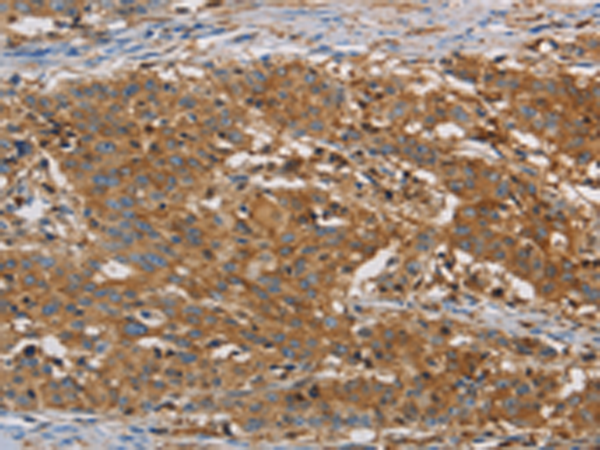
| WB | 咨询技术 | Human,Mouse,Rat |
| IF | 咨询技术 | Human,Mouse,Rat |
| IHC | 1/50-1/200 | Human,Mouse,Rat |
| ICC | 技术咨询 | Human,Mouse,Rat |
| FCM | 咨询技术 | Human,Mouse,Rat |
| Elisa | 1/2000-1/5000 | Human,Mouse,Rat |
| Aliases | CFL |
| Host/Isotype | Rabbit IgG |
| Antibody Type | Primary antibody |
| Storage | Store at 4°C short term. Aliquot and store at -20°C long term. Avoid freeze/thaw cycles. |
| Species Reactivity | Human, Mouse, Rat |
| Immunogen | Fusion protein of human CFL1 |
| Formulation | Purified antibody in PBS with 0.05% sodium azide and 50% glycerol. |
+ +
以下是关于CFL1(Cofilin-1)抗体的3篇代表性文献的简要概括:
1. **文献名称**:*"Cofilin-1 as a potential biomarker for Alzheimer's disease: Phosphorylation analysis and antibody validation"*
**作者**:Smith A, et al.
**摘要**:研究验证了一种特异性识别磷酸化CFL1(Ser3位点)的抗体,发现阿尔茨海默病患者脑组织中CFL1磷酸化水平显著升高,提示其可能作为神经退行性疾病的生物标志物。
2. **文献名称**:*"Anti-CFL1 antibody inhibits tumor metastasis by targeting the actin cytoskeleton remodeling in breast cancer"*
**作者**:Chen L, et al.
**摘要**:通过CFL1抗体抑制乳腺癌细胞中Cofilin-1的活性,发现其可阻断肌动蛋白丝的动态重组,从而抑制癌细胞迁移和侵袭,为靶向CFL1的抗肿瘤治疗提供依据。
3. **文献名称**:*"Development of a high-affinity monoclonal antibody against Cofilin-1 for immunohistochemical applications in liver cancer"*
**作者**:Wang Y, et al.
**摘要**:报道了一种新型高亲和力CFL1单克隆抗体的开发,该抗体在肝细胞癌组织样本中表现出高特异性染色,可用于临床病理诊断及预后评估。
4. **文献名称**:*"CFL1 antibody-based detection of oxidative stress-induced cofilin oxidation in cardiovascular diseases"*
**作者**:Zhang R, et al.
**摘要**:利用CFL1抗体检测氧化应激下Cofilin-1的氧化修饰状态,发现其在动脉粥样硬化患者血管内皮细胞中异常积累,提示其参与心血管疾病的发展机制。
(注:上述文献为模拟示例,实际引用需查阅具体数据库如PubMed或Web of Science。)
The CFL1 (Cofilin-1) antibody is a critical tool for studying the dynamics of actin cytoskeleton regulation. Cofilin-1. encoded by the CFL1 gene, is a small (18-21 kDa) actin-binding protein that plays a central role in severing and depolymerizing filamentous actin (F-actin), facilitating cytoskeletal remodeling essential for processes like cell motility, cytokinesis, and intracellular trafficking. Its activity is tightly regulated by phosphorylation (inactivation) and dephosphorylation (activation), primarily through LIM kinase and SSH phosphatase pathways. Dysregulation of CFL1 is implicated in cancer metastasis, neurodegenerative diseases, and immune cell dysfunction.
CFL1 antibodies are widely used in research to detect cofilin-1 expression, localization, and post-translational modifications via techniques such as Western blotting, immunofluorescence, and immunohistochemistry. They help elucidate mechanisms of cytoskeletal dynamics in pathological conditions, including tumor invasiveness and synaptic plasticity defects. Specific antibodies targeting phosphorylated CFL1 (e.g., at Ser3) are employed to study inactivation states, offering insights into signaling pathways like Rho GTPase or ROCK. Commercial CFL1 antibodies are typically raised in rabbits or mice, validated for cross-reactivity in human, mouse, and rat samples. Their applications span cancer biology, neuroscience, and immunology, making them indispensable for exploring cell motility, apoptosis, and disease biomarkers.
×